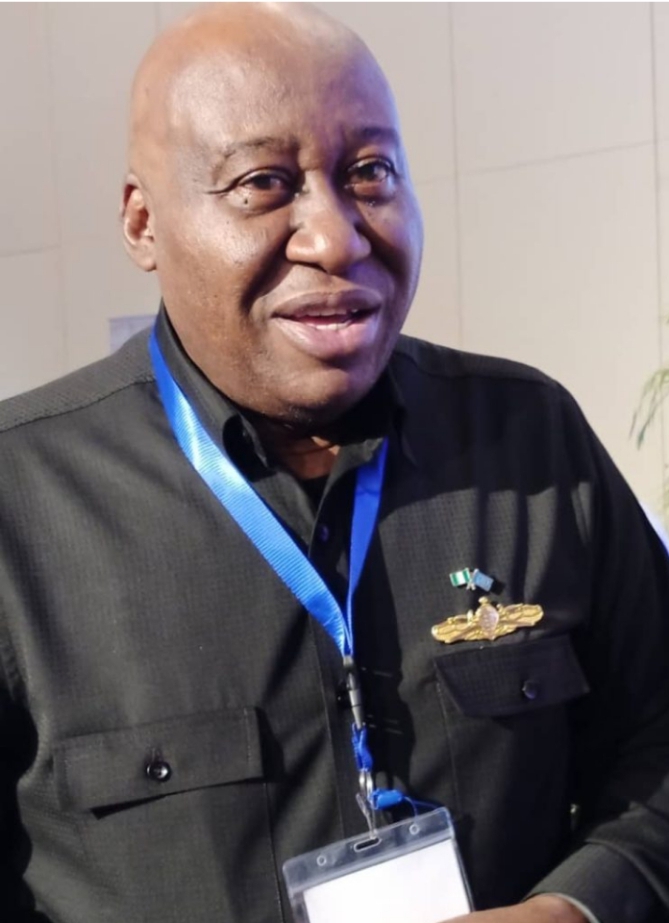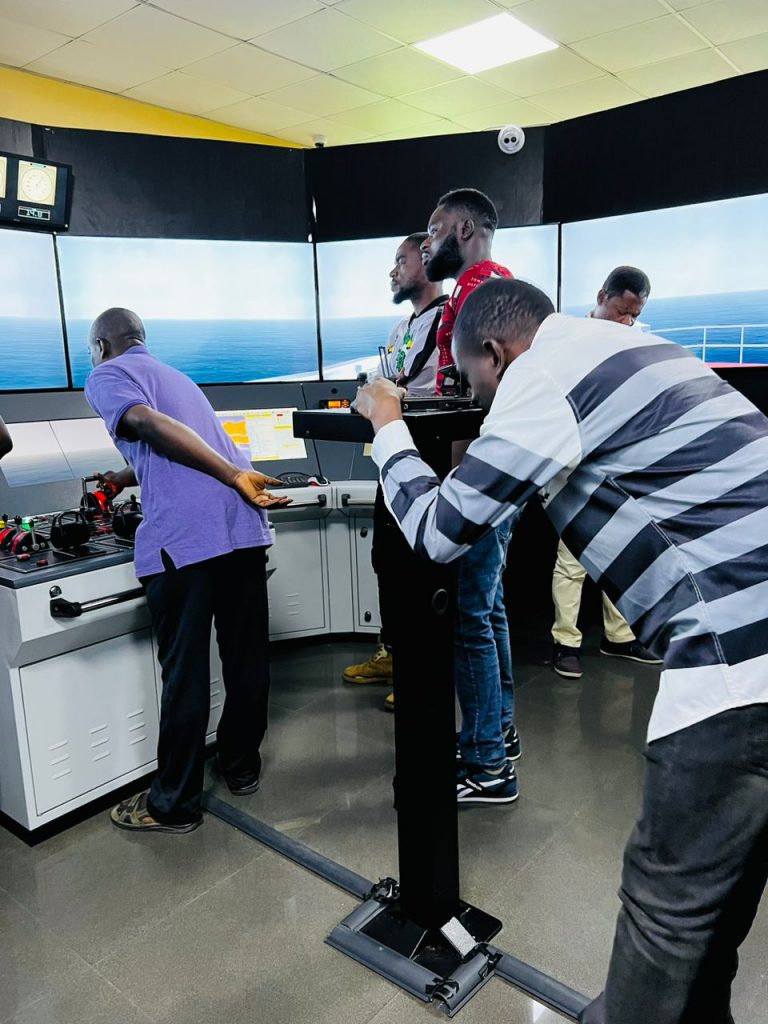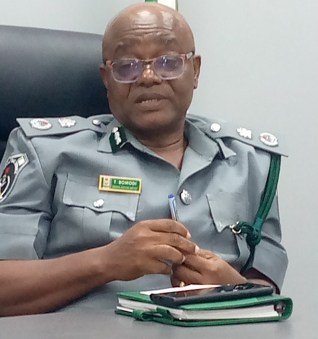Maritime
MAN Rector Lauds Federal Government Support


One of the Simulator Training Rooms
The Rector of the Maritime Academy of Nigeria (MAN), Commodore Duja Emmanuel Effedua (Rtd) has appreciated the Federal Ministry of Transportation (FMOT) and the Nigerian Maritime Administration and Safety Agency (NIMASA) for their supports toward the transformation of MAN to a world-class maritime education and training institution.
Commodore Duja expressed his appreciation Thursday, 19th January, 2023 during the presentation of certificates to the first batch of trainees in the Engine Room Simulator (Operational Level) Course following their successful completion of training at the Academy.
He said that the journey to bring the Academy at par with its counterparts in the global maritime scene began in 2018 with the commencement of the procurement of top-notch training facilities in addition to their installations, noting that the Ministry has been solidly behind his administration’s quest to ensure full realisation of the transformation as specified by the International Maritime Organisation (IMO).
The Rector expressed further confidence that with the continued supports of the Federal Ministry of Transportation and NIMASA, the Academy will sustain its current status as one of the very best Maritime Education and Training Institutions in the world, and even go higher.
During his interaction with the first batch of trainees in the Radar Navigation, Radar-Plotting and Use of ARPA (RNRPA), Coomodore Effedua expressed his happiness with the Academy’s commencement of Simulator-based Courses using the most modern Simulators in the world with the approval of NIMASA. He reminded the participants that the Academy with NIMASA’s approval now has on offer, twelve (12) simulator-based courses for the training of seafarers and their professional development.
He noted that significant foreign exchange that would be saved by the country through the availability of the simulator-based courses in the Academy in view of its very considerate fees. Hitherto, Nigerians needed huge foreign exchange to undertake these same courses abroad at very high costs.
“Today is yet another memorable day for us at the Academy, because we have graduated the first set of students from our newly developed simulator- based courses. I am highly appreciative of the roles played by the Federal Ministry of Transportation and the management of the Nigeria Maritime Administration and Safety Agency towards the realisation of this Academy’s aspirations.
“This feat, though it was not an easy one, would not have been achieved without their unflinching supports”, he stated.
One of the pioneer batch students, an ex-cadet and a Third Engineer, World Carrier Shipmanagement, Engr. Patrick Audu, expressed his satisfaction over the quality of training he received, noting that the training facilities, learning environment and quality of instructors are of international standard.
He commended the management of the Academy for raising the bar of education and training in the institution and called on other industry workers to endeavour to acquire their various trainings at the Academy instead of spending money to travel abroad for a training they can get in Nigeria at even cheaper rates.
“I must say that I am very impressed at the new look that my alma mata is wearing, it is quite impressive. I was here as a Cadet in 2014, I know how it was back then, coming back to see the level at which the institution has been transformed is quite encouraging. I want to appreciate the management of the Academy for putting this in place and I want to tell them to ensure it is sustained.
I also want to encourage my colleagues in the industry to come and get trained at the Academy instead of going abroad for courses they can get at the Academy and at a cheaper rates”, he noted.
It is a fact to say that Nigeria’s premier maritime education and training centre, the Maritime Academy of Nigeria is now world-class, in view of the quality of training facilities, competent instructors, conducive learning environment, amongst other things it now parades.
Wiith the acquisition of high quality Simulators, the Academy now offers the following twelve Courses: Ship Simulator & Bridge Teamwork (SSBT); Global Maritime Distress and Safety System (GMDSS) General Operators Certificate (GOC) Course; Electronic Chart Display and Information System (ECDIS); and Radar Navigation, Radar Plotting and Use of ARPA (RNRPA).
Others are Liquid Cargo & Ballast Handling Simulator (LCBHS); Bridge Watch-Keeping Preparatory Course (BWPC); Engine Room Simulator (Operational Level) Course (ERSOL); Engine Room Simulator (Management Level) Course (ERSML); High Voltage Course (HV); Auxiliary Engine Familiarization Course (AEFC); Boiler Familiarization Course (BFC) and Engine Room Watchkeeping Preparatory Course (ERWPC).
Also, the Academy’s Simulators are the latest in the world of simulation, they are not generic, but custom made to meet the current training needs in the maritime industry. The Multi-functional Classroom Simulator, has eight Simulators embedded in one and has the capacity to hold different Courses at different times for both Engine and Deck students; and can accommodate up to thirty trainees at a time.
With the Full Mission Engine and Full Mission Deck Simulators, real life Engine Room and Deck situations can be simulated to give trainees real life sea experiences. While the Full Mission Deck Simulator can simulate any type of vessel including Warship, Tanker vessels- LNG, LPG Oil Tankers, the Full Mission Engine can simulate the movement of various engine parts and everything that goes on in a real engine room situation including engine room watch keeping, monitoring of lubrication oil and moving parts of the engine.
Another type of Simulator owned by this great citadel of learning is the Ocular Vision Simulator which when worn on the head launches the trainee into a virtual engine room where they can operate functions like operating of valves, switching on and off machineries within the engine of a ship.
The Maritime Academy of Nigeria located in Oron, Akwa Ibom State established in 1977, is the nation’s premier maritime education and training centre. It was originally designed as an integrated institution for the education and training of shipboard officers, ratings and shore-based management personnel. The scope of the college was later upgraded by the promulgation of Decree No. 16 of 1988 with a statutory mandate to train all levels and categories of personnel required for the effective and efficient operation of all facets of the Nigerian maritime industry.
MAN Public Relations Department

























